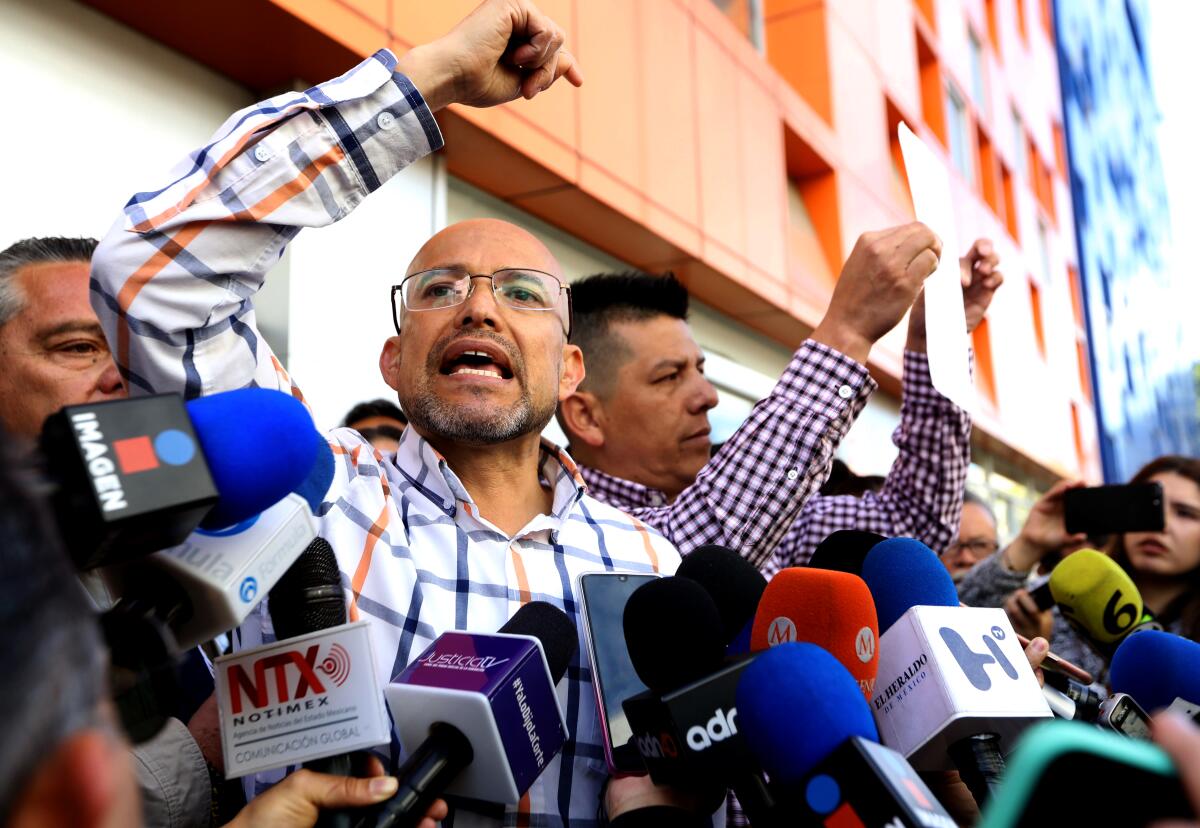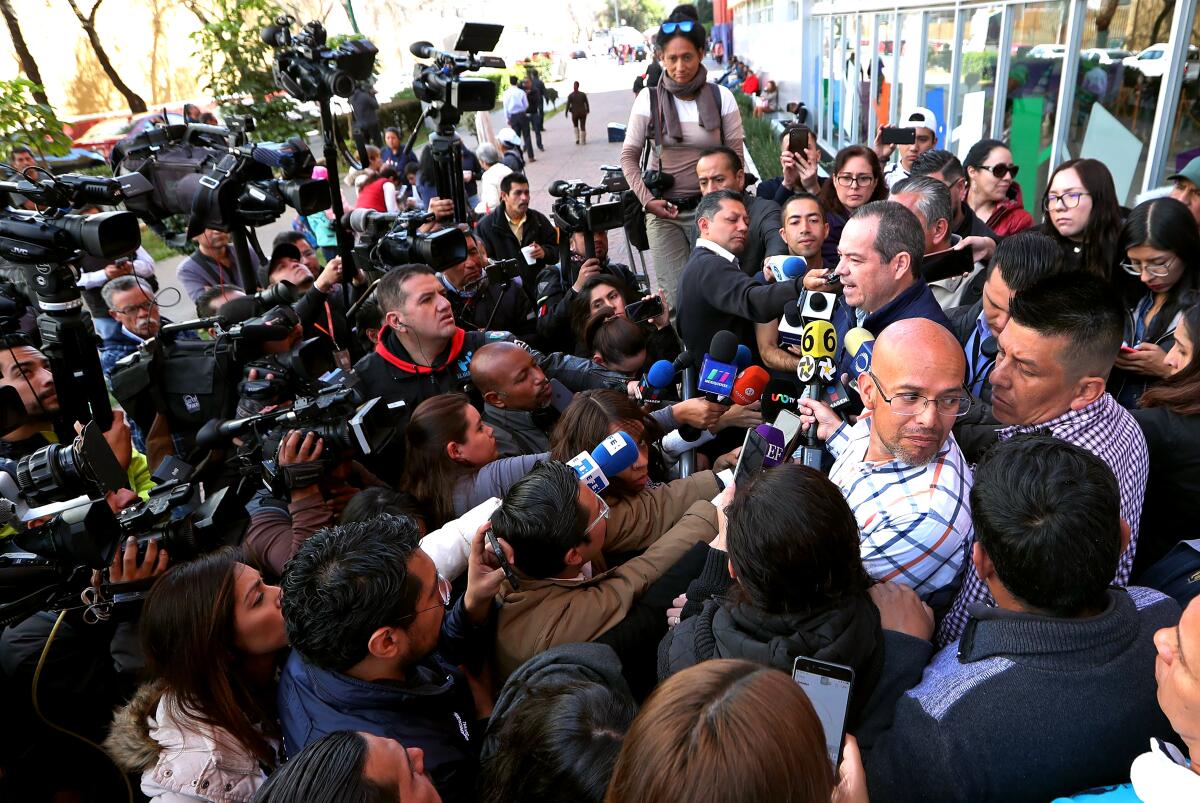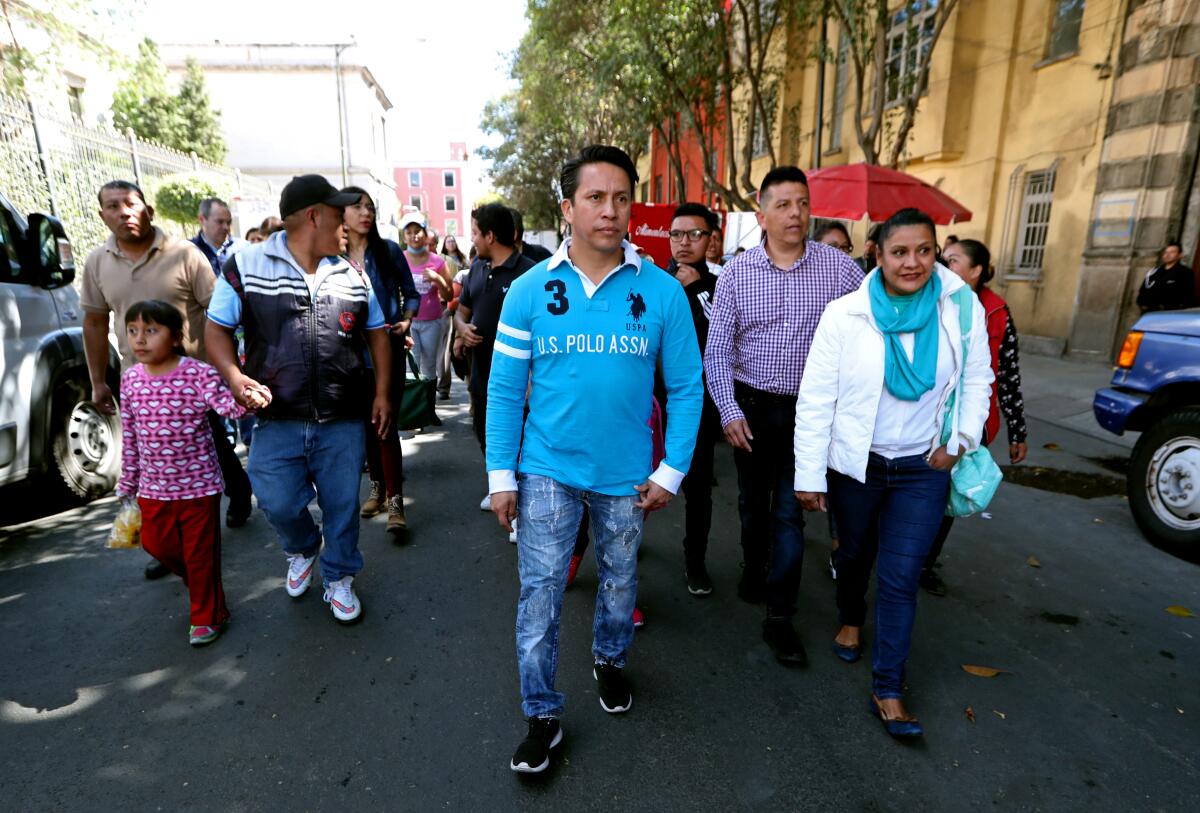In Mexico, parents protest lack of cancer drugs for their children

- Share via
MEXICO CITY — Street protests are a near-daily occurrence in the Mexican capital, with boisterous marchers advancing down major thoroughfares shouting slogans and bearing banners denouncing anything from rampant corruption to stagnant wages to inadequate public transport.
In recent weeks, though, Mexico City has seen public grievance airing from a singularly sympathetic interest group — parents of children with cancer. They have taken to the streets to block traffic and publicly denounce a dearth of cancer medicines at public hospitals nationwide, a shortage that threatens their kids’ lives.
“It’s very painful to see the suffering of a child and know that neither his pain nor his life is important to the authorities,” said Ricardo Solorio, 43, a shop owner from the Pacific Coast city of Acapulco.
Solorio was among a group of about 70 parents of cancer patients — mostly from low-income families — who marched in protest through downtown Mexico City on Tuesday , demanding that more life-extending medicines be made available.
It was a direct challenge aimed at President Andrés Manuel López Obrador, who has pledged to transform Mexico’s moribund public healthcare regimen into a high-quality, fee-free service in line with his campaign motto: “For the good of all, the poor come first.”
Parents of youngsters with cancer say reality on the ground belies the slogan.
Since October, Solorio said, the major public cancer hospital in Acapulco has not had adequate chemotherapy treatments for his son, José, 8, who is fighting leukemia. Officials at the State Cancer Institute in Acapulco where Solorio says his son was treated did not return a telephone message seeking comment.
The father’s account mirrored those from parents from across the country who in recent weeks have assailed a lack of cancer medicines.

The protests have drawn accusatory ripostes from López Obrador, who rejects any suggestion that his budget cuts or reforms to the health and financial sectors have anything to do with the lack of lifesaving drugs.
Instead, the avowedly leftist president — who ran on an anti-corruption campaign plank — blames what he calls a crooked network of hospital administrators working in cahoots with pharmaceutical companies to keep supplies low, prices elevated and kickbacks high.
“The health system is rotten,” López Obrador declared in January, excoriating“monopolies” that control much of hundreds of millions of dollars of medicines sold to the government for use in public hospitals each year.
Last week, the president accused pharmaceutical profiteers angered at his proclaimed crackdown on overpricing of endeavoring to “blackmail” the government by holding back supplies of cancer medicine.
“There has been a lot of corruption in the health sector — they even robbed the money for medicines that was supposed to be used to cure the sick,” López Obrador said last week. “Ambitious people, without scruples.”
But, he vowed: “There will be no shortages of medicines.”
The president went so far as to link the director of the Federico Gómez Infant Hospital of Mexico, the capital’s preeminent pediatric facility, with the alleged corruption. That drew a spirited denial from the hospital director, Jaime Nieto Zermeño, a respected pediatrician with more than three decades in the field.
“I have nothing to hide,” Nieto Zermeño told Mexico’s Radio Formula, vowing to cooperate with any government investigation. “It doesn’t please me that the president ... thinks that I am corrupt.”
In a video circulating on social media, doctors and nurses at the hospital greeted the director with supportive shouts of “You are not alone!” following the president’s public shaming of the veteran physician.

Several pharmaceutical companies are under investigation in connection with questionable purchase practices, Irma Eréndira Sandoval Ballesteros, the president’s anti-corruption chief, told reporters.
No one disputes the president’s argument that corruption in procurement has contributed to the many deficiencies in Mexico’s public healthcare system. But some have questioned López Obrador’s sole focus on graft and greed, suggesting that his fiscal austerity policies may have made a bad situation worse.
Last May, the head of Mexico’s giant Social Security Institute stepped down, issuing an unusual public resignation letter declaring that “excessive savings and controls in health spending are inhumane” — and disproportionately affected the most needy.
A report in recent days in Mexico City’s El Universal newspaper cited internal government documents suggesting that López Obrador’s policy of consolidating purchases of medicines and other goods under the umbrella of Mexico’s Finance Ministry may have slowed the process and contributed to shortages.
Shortfalls of medicines in public hospitals and clinics have been reported across the country since López Obrador, who took office in December 2018, embarked on his program of deep cuts in government spending.
AIDS patients protested publicly last year about a lack of drugs, a problem that many blamed on budget reductions. People with hepatitis have also faced shortages.
On a recent morning, Dolia Morelos, 67, went to the public Rubén Darío Fernández General Hospital in the southern reaches of Mexico City to seek medicine for her husband, who has diabetes. She says she was turned away and told that there were no drugs available.
“They told me it’s better if I go to a private hospital,” a frustrated Morelos said outside the facility. “But that’s very expensive and we don’t have that kind of money. I don’t work, and my husband is retired. I’m very worried. I don’t know what we are going to do.”
Most Mexicans seeking healthcare turn to the country’s vast but overburdened network of public hospitals and clinics, where fees are minimal but clients often face long delays in securing needed procedures and are sometimes asked to provide basic materials including surgical masks and gowns themselves, patients say. Private hospitals, which have reported no shortages of medicines, are generally the realm of middle-class and wealthy Mexicans.
Since taking office, López Obrador has created a national health institute and declared that, in three years, the country’s healthcare system would rival that of Denmark — a relatively corruption-free and peaceful nation that the president often cites as a model for Mexico.
But critics say López-Obrador’s Nordic idyll is more pipe dream than reality in a country where parents can’t secure basic cancer-fighting medicines.
“I voted for López Obrador because I believed in him … but we’ve ended up in worse shape than before,” said Maricarmen Torres Valencia, 39, a protester who said she was having trouble finding drugs for her daughter, Maria, 9, who has leukemia. “They tell us that there are no medicines because the government hasn’t authorized the purchase of them. ... That’s a crime here, and anywhere in the world. It is something that will remain forever on the conscience of López Obrador and his government.”
Confronting the parents on a downtown street were a group of pro-López Obrador counterprotesters who labeled the marchers “traitors” and shouted “Amlo! Amlo!” in support of the president, using his nickname.
Such groups now regularly challenge antigovernment protesters. But the parents of cancer patients were eventually able to meet with the president’s interior minister, Olga Sánchez Cordero, who vowed to help make the medicines available and later sent a Twitter message saying the protesting parents and their ailing children “have my solidarity and empathy.”
The desperate parents remain skeptical, however.
“What will the government say in six months when these children die of cancer?” asked Sergio Villarreal, 41, a bus driver from southern Oaxaca state who was among the marchers and whose son, Sergio, 6, is being treated for a brain tumor. “I doubt the president or his government is going to say they were responsible for the childrens’ deaths because the medicines were not available.”
McDonnell is a Times staff writer, Sánchez is a special correspondent.
More to Read
Sign up for Essential California
The most important California stories and recommendations in your inbox every morning.
You may occasionally receive promotional content from the Los Angeles Times.









